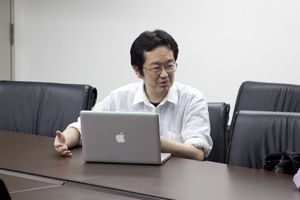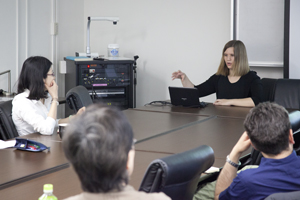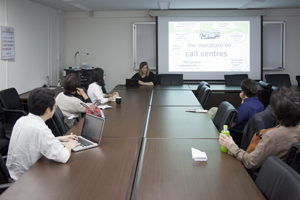News
東文研セミナー 「“A call centre is like a free language course” – an analysis of language learning in a European and Asian call centre」が開催されました
報告
Johanna Woydack氏は、コールセンターでの労働に対して従来与えられてきた否定的で批判的な評価と、コールセンターで働く人々自身が持つ肯定的な評価の間の乖離を一つの手掛かりとして、自身のフィールドワークに基づき、コールセンターに関する先端的な社会言語学的民族誌というべきものを提示した。ロンドンのコールセンターの事例に基づき、コールセンターとその仕事の諸側面、誰がコールセンターにどの程度の期間勤めるのかといった点を示した後、コールセンターでの仕事を通じた言語の学習過程が分析された。議論は、フィリピンのコールセンターとの比較や、実際のトランスクリプトの分析にも及んだ。その後7名の参加者により、コールセンターにかかわる人々の関係性から、言語習得におけるscriptの役割に至るまで、活発な議論が行われた。
当日の様子
 |  |
 |  |
開催情報
Date and Time: April 27, 2015 17:30-19:00
Venue: Seminar Room 1 (3F) Institute for Advanced Studies on Asia The University of Tokyo (東京大学東洋文化研究所3階 第1会議室)
Speaker:
Dr. Johanna Woydack, Assistant Professor, Wirtschaftsuniversität Wien (Vienna University of Economics and Business)
Title:
“A call centre is like a free language course” – an analysis of language learning in a European and Asian call centre
Abstract:
With a few exceptions, little research has been conducted on language learning in the workplace. Usually it is assumed that they do not provide much affordance for this. This is especially the case for low-skilled jobs, which frequently function as entry jobs for immigrants. In this paper, the case of call centres is explored which have been described as deskilling because of the lack of opportunity for learning. Calling scripts are usually blamed for this since they minimise learning and remove agent’s agency. The methods used in this study include long-term participant observation, sixty interviews with agents, and recording of telephone conversations. The research draws on data collected in two locations. The first is a multilingual London call centre that calls on behalf of external clients in any language desired. The context described shows a shortage of certain language speakers meaning that agents are asked to call in languages they are not fluent in. The paper explores how agents, often newly arrived immigrants, use scripts to improve their knowledge of other languages. Agents describe the call centre cold-calling context as the best opportunity for a foreign language drill. Once they feel more confident in the target language, they often successfully apply for new more prestigious jobs and are considered legitimate speakers. Call centre agents in the Philippines make similar claims about scripts and language learning. The study argues for a re-evaluation of scripts for language learning as well as the notion of call centres as deskilling.
*The lecture is open to public; no registration is required.
担当:名和
登録種別:研究活動記録
登録日時:ThuApr3012:01:462015
登録者 :名和・野久保(撮影)・藤岡
掲載期間:20150427 - 20150727
当日期間:20150427 - 20150427


